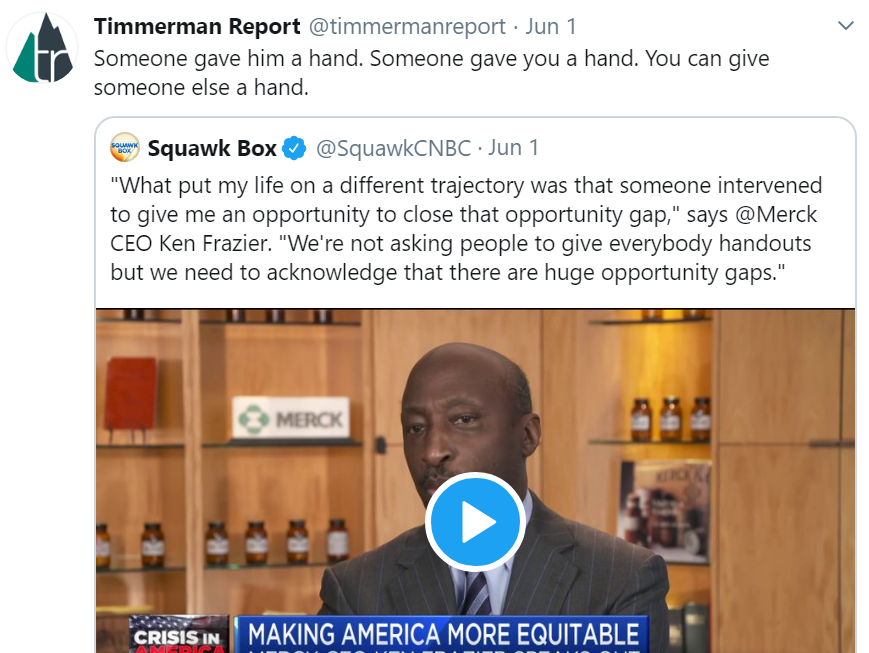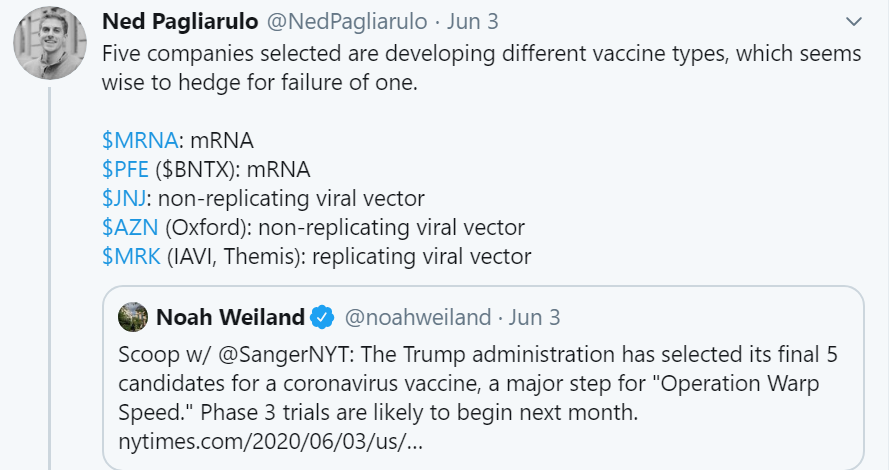Anger, Pain, and Hope

Luke Timmerman, founder & editor, Timmerman Report
The emotions this week were especially intense. Anger. Fear. Despair.
But there was also hope. That gets me up in the morning.
In this slice of America, the biotech industry, many people are mission-driven.
People in this industry work every day to improve the human condition by making better medicines.
Not everyone feels the full weight, but many in this part of the scientific problem-solving enterprise didn’t need a news flash that African Americans suffer terrible disparities in things like heart disease, cancer, diabetes, asthma, and now COVID-19.
What I saw this week were glints of new awareness — a growing recognition, let’s say — that the injustice inflicted on African Americans for 400 years is inextricably linked to those health disparities. The mission of biopharma is about improving health. But health is connected to all of those underlying things like housing, education, and criminal justice that are terribly unjust.
If people don’t dig into the root causes to make a better world for everyone, how can we begin to improve health?
The good news is, these protests are starting to move people.
This is a start.
Events move so fast now, it’s easy to lose track of actual progress being made. The police officer that killed George Floyd in Minneapolis had his charge upgraded to second-degree murder. The other three officers — who stood there and didn’t do anything to save him while he cried “I can’t breathe” and begged for his mother — they were charged with aiding and abetting. After days of protestors demanding they be charged.
George Floyd’s family asked for Minnesota Attorney General Keith Ellison to prosecute the case. The attorney general of Minnesota, no less, answered that call.
New investigations into troubling cases of African Americans dying in police custody are being opened up all around the country.
Mayors, Governors, police chiefs, and even some police union leaders all over the country, are speaking out like never before against the horrific acts of the Minneapolis police caught on video. The Republican governor of Maryland called Minneapolis police officer Derek Chauvin a “murderer in a blue uniform.”
Thoughtful executives, like Ken Frazier of Merck, could do the easy thing and say nothing. Or issue a statement with some generic platitudes. Instead Frazier said something real, both about George Floyd’s case and about how his life fortunately went down a different path.
He said it on national TV, on a channel that the powers-that-be actually watch.

This is a start.
If you’re ever going to change laws, change police union contracts, change structures around citizen review boards, and begin to hold cops accountable – you have to start with recognizing there’s a problem and applying pressure.
This is a start.
These things are happening because of the public pressure being brought by protestors.
Young people are demanding action at the local and state level. People in power in Minnesota, and elsewhere, seem to be listening and acting accordingly. They might listen some more, and continue to act accordingly, if the pressure remains relentless.
We need to watch out for the violence and senseless rioting. That’s destructive and wrong. It’s damaging to people’s livelihoods, including livelihoods of African American business owners. It needs to be stopped. Throwing bricks through windows and stealing merchandise? It doesn’t do any good, and we don’t really know who’s doing it and why. Then we watch cops do more abusive things in the heat of the moment, whether it’s because of all-too-human nerves, or because of foolish orders from above.
These past few days have gotten better on these counts. I believe the protestors, as long as they stay peaceful, might just have staying power during this summer of so much pain.
Tremendous acts of community kindness – offerings of water, sunscreen, food and more – are sustaining protestors. See this young woman describe the remarkable generosity she has witnessed in Minneapolis.
Many of us in biopharma are wondering what we can do. It’s easy to surrender to helplessness against a problem this big, this deeply engrained. Where to start? What difference can anyone make? Why bother?
That’s nihilism talking. That’s no way to live.
There are things we can do. Small things, maybe, but things that matter.
Many of you read Rob Perez’s guest article on things biopharma can do to dig deep and fight hard, against injustice. I think people are listening more than in the past.
This is a start.
We can use this moment to teach our children about right and wrong, in terms of racial justice. We can use this surge of energy to vote out dangerous leaders in Washington DC, and vote in a new generation of people willing and able to do the hard work in our communities of dismantling systemic racism – in criminal justice, in housing, in education, in health.
All these things are connected. We need to get our hands dirty, down there at the roots, if we really want to make progress across the board.
Nobody can do this alone. But if everybody digs in – and, crucially, is willing to stick with this long past the end of the news cycle – then we will have accomplished something meaningful.
Politics
The President said he’s pulling the United States out of the World Health Organization in the middle of a pandemic. It will harm people around the world, especially in developing countries. If he follows through with this threat, it will diminish US influence on the world stage. It will create an opening for China and others to seize, gaining more influence over how the pandemic response is run. To say the WHO is perfect would be wrong. It has made serious errors, like not declaring COVID-19 a global pandemic in January. But pulling out of the WHO completely, at this moment, is impetuous and short-sighted and dangerous.
The Pandemic Toll
The pandemic was pushed down in people’s news feeds. But let’s not forget. We have 108,000 deaths in the US, and almost 1.9 million cases. The New York Times reports 17 states where cases were increasing over the past week, and 15 states where cases were decreasing.
Science
- ‘It Opens Up a Whole New Universe.’ CryoEM Sees Individual Atoms for the First Time. Nature. June 3. (Ewen Callaway)
- Effect of Convalescent Plasma in Patients with Severe COVID-19. A Randomized Controlled Trial. JAMA. June 3. (Ling Li et al)
Science Features
- The CDC Waited Its Entire Existence for This Moment. What Went Wrong? NYT. June 3. (Eric Lipton et al)
- COVID-19 Can Last for Several Months. The Atlantic. (Ed Yong)
- The Untold Story of the Moderna Coronavirus Vaccine. Boston magazine. June 4. (Catherine Elton)
- Why Coronavirus Hits Men Harder. Sex Hormones Offer a Clue. Science. June 3. (Meredith Wadman)
- The Global Race for a Coronavirus Vaccine Could Lead to This Generation’s Sputnik Moment. Washington Post. June 3. (Carolyn Johnson and Eva Dou)
- Blood Vessel Attack Could Trigger Coronavirus Fatal ‘Second Phase’. Science. June 2. (Catherine Matacic)
Treatments
Gilead Sciences released some Phase III data from a remdesivir study of patients with moderate forms of COVID-19. These results, as many expected, were more encouraging than the earlier results from a study of more severely ill patients. The 5-day course of treatment was also the way to go, which is good news for stretching out manufacturing supplies around the world.
If you’re looking for important, under-covered stories on the pandemic, look at Eli Lilly’s neutralizing antibody candidate for COVID-19. In collaboration with AbCellera and researchers at the National Institute of Allergy and Infectious Disease, the team picked an antibody from the blood of a recovered patient, made recombinant copies as biopharma companies do so well, and now have it in patients in a clinical trial in the span of about three months. Along with Regeneron and VIR Biotechnology, these therapeutic antibodies have a chance to mitigate the pandemic in the interim period before we get a vaccine.
Hydroxychloroquine failed to prevent healthy people from getting COVID-19 in a clinical trial. The study was conducted at the University of Minnesota, and enrolled healthcare workers. See the Washington Post coverage.
Vaccines
- AstraZeneca Lays Out Plan to Produce 2 Billion Doses of Coronavirus Vaccine. STAT. June 4. (Matthew Herper)
- GAVI, The Global Vaccine Alliance, Launched $2B Advance Market Commitment to Deliver COVID-19 Vaccines Equitably Through the World. (GAVI statement)
- Tony Fauci Didn’t Like the Early Data Release on Moderna Vaccine. STAT. June 1. (Helen Branswell)
- The Five Leading Vaccine Candidates Prioritized by Operation Warp Speed. (See below)

Public Health
- White House and CDC Remove Coronavirus Warnings About Choirs in Faith Guidance. Washington Post. May 28. (Lena Sun and Josh Dawsey)
- Tear Gas Is Way More Dangerous Than Police Let On, Especially in a Pandemic. ProPublica. June 4. (Lisa Song)
- Former CDC Director Says US Led the World Before Becoming a Global Health Laggard. Washington Post. May 29. (Joe Davidson)
- Evidence for COVID-19 Spread in January and February. May 29. CDC. (Greg Armstrong et al)
- Will Protests Set of a Second Wave? NYT. June 4. (Roni Caryn Rabin)
- Zoloft Falls Into Short Supply as Virus Anxiety Strains Supplies. Bloomberg News. June 1. (Anna Edney)
A Big Retraction
The Lancet retracted a widely-read May 22 paper on hydroxychloroquine and chloroquine as treatments for COVID-19. The original article said there was no benefit seen, based on evaluating a registry with records from 96,000 patients. The authors wrote in their retraction, “we can no longer vouch for the veracity of the primary data sources.” Retractions are never good, but especially in a pandemic when we need trustworthy sources of scientific information and guidance. What’s the big takeaway from this? See Ashish Jha below.

Another paper that depended on Surgisphere for raw data collection appeared suspicious enough to generate an “Expression of Concern” in the New England Journal of Medicine. That was for a paper titled “Cardiovascular Disease, Drug Therapy, and Mortality in Covid-19.” Strangely, the authors of that paper “all the authors were not granted access to the raw data and the raw data could not be made available to a third-party auditor.” Maybe this is just naïvete, but aren’t authors of a scientific paper supposed to have access to raw data so they can properly analyze and summarize? This doesn’t smell right.
Deals
Cambridge, Mass.-based Intellia Therapeutics pocketed $100 million upfront ($70 million cash and $30 million equity investment at $32.42 a share) as part of a collaboration with Regeneron Pharmaceuticals to develop CRISPR-based treatments for hemophilia A and B. The companies have experience working together already, and this is an expansion of the prior collaboration.
Berkeley, Calif.-based Aduro Biotech merged with privately-held Vancouver BC and Seattle-based Chinook Therapeutics. The new company, called Chinook Therapeutics, will be led by Chinook CEO Eric Dobmeier. Chinook now will get a Nasdaq listing, will have $200 million of cash in the bank, and the runway to pursue its precision medicine approach to kidney disease.
Lexington, Mass.-based Accent Therapeutics, the developer of cancer drugs that target RNA-modifying enzymes, secured a $55 million upfront payment as part of a collaboration with AstraZeneca.
Data That Mattered
Waltham, Mass.-based Minerva Neuroscience said its drug candidate for schizophrenia failed in a placebo-controlled Phase III trial of 515 patients. The stock collapsed, down 70 percent.
Gilead Sciences released updated safety data from more than 4,500 patient years of experience with filgotinib, the oral JAK1 inhibitor for rheumatoid arthritis, at the European League Against Rheumatism conference. The drug is part of the collaboration with Galapagos NV of Belgium.
Regulatory Action
AbbVie won FDA clearance to market elagolix estradiol, and norethindrone acetate (Oriahnn) capsules as a treatment for heavy menstrual bleeding due to uterine fibroids. It’s the first oral treatment of its kind.
Eli Lilly won FDA approval for its IL-17 alpha inhibitor, ixekizumab (Taltz) for non-radiographic Axial Spondyloarthritis, including ankylosing spondylitis.
Personnel File
Mark Genovese was hired as senior vice president of inflammation at Gilead Sciences. He was on the faculty at Stanford University for 21 years.
Admiral Brett Giroir, who has been leading coronavirus testing efforts for the federal task force, said he’s being “demobilized” from that effort, and going back to his regular role at the Department of Health and Human Services, according to NPR.
Sanofi Ventures hired Jim Trenkle as head of investments. He was previously with Pivotal Bioventures. Cris de Luca also joined as global head of digital investments. He was previously with Johnson & Johnson Innovation and JLABS.
Financings
- South San Francisco-based Pliant Therapeutics, a developer of treatments for fibrosis, raised $144 million in an IPO priced at $16 a share. See my coverage from its startup days in Forbes ( 2016).
- Cambridge, UK, Seattle and Lexington, Mass.-based NodThera, a developer of anti-inflammatory drugs, received $55 million in a Series B financing. Novo Ventures led.
- Cambridge, Mass.-based Intellia Therapeutics, the CRISPR drug developer, raised $100 million in a stock offering after the positive news of its expanded collaboration with Regeneron.
- Shanghai-based Everest Medicines raised $310 million in a Series C financing.
- Seattle-based Athira Pharma, an Alzheimer’s drug developer, raised $85 million in a Series B. Perceptive Advisors led.
On Grace
Tony Dungy, the Hall of Fame football coach, is a man of deep religious faith. I have respected him for years. He offered some wisdom — that rarest and most valuable of things — on a sports radio call-in show.
Dungy spoke his calm, empathetic words in the middle of the outraged, frenetic aftermath of what New Orleans Saints quarterback Drew Brees said about protests. Brees, a man with some great African American teammates, said something that was clueless and insensitive and self-centered. He later apologized.
We’ve seen this kind of foot-in-mouth moment a million times. In 400 years, we’ve never had an adult conversation about race in the US in which everyone sits and truly listens. If we’re going to take a deep breath and have that necessary conversation, the kind that’s incredibly painful but builds bridges of awareness needed to make things right, then our best bet is to look to community leaders like Dungy.
He’s giving people some space. Allowing them some room to say dumb things. Things that are awkward or tone deaf. Notice, Dungy didn’t excuse what Brees said and didn’t apologize for him. But he’s creating some room where people can listen to each other, and begin to understand why what the great quarterback said was so hurtful to so many of our fellow citizens.
People need to be given the room to make mistakes, and to see the error of their own ways. To begin to realize that perhaps they have blind spots. If people don’t feel they can be open and honest, and let their ignorance and clumsiness be forgiven, then they’ll crawl back into a shell, clam up, or stay in denial.
The worst among us will lash out in performative defensiveness and cash in off their perceived “victimhood.”
If that happens, we’ll stay right where we are, stuck in a rut, with terrible injustice happening all around us every day. With the majority of the country blind to the horror.
I want this terrible racism to end with our generation, and for our kids to grow up in a more humane and empathetic world.
Those of us — like me — who are privileged and don’t walk down the street afraid of police, need to stand shoulder-to-shoulder with those who do. We need to insist on this change, and be relentless about that change, right there with our black brothers and sisters.
It’s our job to have the awkward, painful, tearful conversations with our family members and friends who aren’t yet all the way there with us on this journey.
As Martin Luther King said: “Injustice anywhere is a threat to justice everywhere.”
As Frederick Douglass said: “Power concedes nothing without a demand.”
As John Legend wrote: “Justice for All Ain’t Specific Enough.”
The injustice is so pervasive, and so deep. We need to demand it end. Then we roll up our own sleeves. It’s not someone else’s job. For us to rip out the roots of this enduring injustice, we need to get comfortable with being uncomfortable.
Do everything Rob Perez wrote about this week. When you’ve done all that, think about doing more.
Do it with empathy, with patience. The conversations we need to have to change people’s hearts will happen in unusual places, unusual settings. Not just from a podium or a pulpit.
If you listen to Tony Dungy talking with a sports talk radio host — a young white guy — then you’ll get a feel for the words, the tone, the setting. This is what it’s about. Watch the empathy and respect he has for his conversation partner.
This is change in action.





